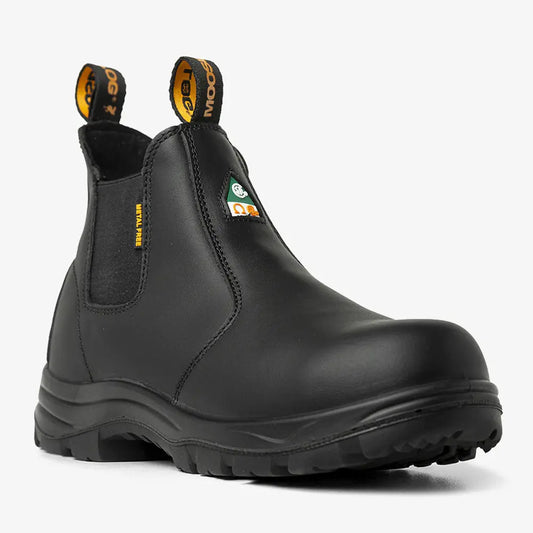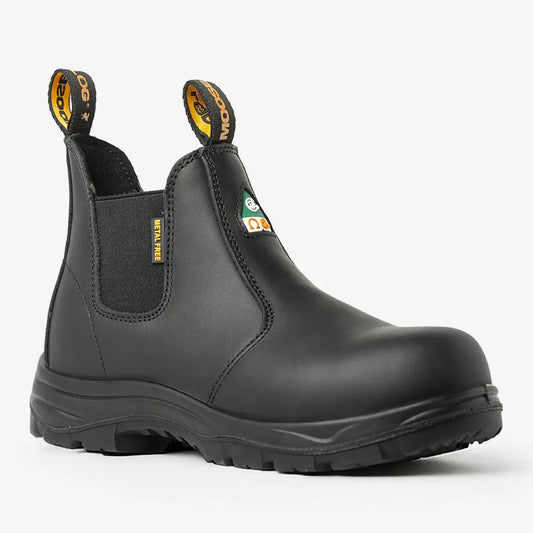
5 Reasons Lightweight Safety Boots Are a Must for Skilled Trades
Working in the skilled trades isn’t just physically demanding — it’s precision-focused, fast-paced, and often performed in unpredictable conditions. Whether you're wiring electrical systems, framing a new structure, or repairing HVAC systems in tight spaces, your gear has to keep up.
Your boots? They’re the foundation of your performance. And that’s exactly why lightweight safety boots are becoming a top choice among tradespeople across Canada and the U.S.
Built for agility, certified for safety, and designed for long shifts, lightweight work boots are more than a trend — they’re a modern essential for those who work hard and move fast.
1. They Help You Move Freely in Tight Spaces
If you’re a plumber, HVAC tech, electrician, or framer, you’re constantly climbing, crouching, and twisting into awkward positions. Heavy boots can feel like anchors when you're trying to get the job done efficiently.
Lightweight safety boots reduce the strain on your lower body and allow for:
- Easier kneeling and crouching
- Faster adjustments in small workspaces
- Quicker climbs on ladders and scaffolding
Freedom of movement is key in these trades — and heavy boots only get in the way.
2. No Sacrifice on Safety
Let’s be clear: lightweight doesn’t mean less safe — not when you choose CSA approved and ASTM certified footwear.
These standards guarantee the boots have been tested for critical features like:
- Impact and compression resistance
- Puncture-resistant plates
- Electrical hazard (EH) protection
MooseLog’s lightweight boots meet both CSA and ASTM standards — meaning you’re protected on-site without dragging around extra weight.
Want to dig into what those certifications really mean? Here are the official resources:
3. You Stay Focused Longer
The longer the day, the more you feel every ounce on your feet. Traditional boots wear you down by hour six. That’s when fatigue kicks in — and that’s when mistakes happen.
Lightweight safety boots help preserve energy, which leads to:
- Fewer slips in focus
- Fewer breaks due to sore feet or heavy legs
- Better attention to detail, even late in the day
Trades are built on precision — and staying sharp all shift long is critical.
4. Perfect for Multi-Tasking Roles
Many tradespeople don’t just do one thing — you might drive between job sites, climb ladders, load equipment, and do fine detail work all in one day. A bulky, rigid boot slows you down.
Lightweight safety boots adapt to the flow of your day, giving you:
- The protection you need in hazardous zones
- The flexibility to shift tasks without changing gear
- A better experience in fast-moving, multi-skill roles
They’re not just safer — they’re more functional for how you actually work.
5. Better Support for Self-Employed and Small Crew Trades
When you run your own show, or work in a tight-knit crew, there’s no room for downtime. You need gear that supports efficiency, comfort, and endurance from job to job.
MooseLog’s lightweight safety boots are perfect for:
- Contractors juggling multiple sites
- Renovation crews who handle a variety of tasks
- Solo tradespeople who need gear that’s versatile and durable
You don’t have time to deal with sore feet — and with the right boots, you won’t have to.
Why Tradespeople Trust MooseLog
At MooseLog.com, we design boots for workers who move, build, and fix. Our lightweight safety boots are built to perform under pressure — and they’re always:
- CSA Approved
- ASTM Certified
- Puncture-Resistant
- Engineered for comfort and flexibility without compromise
We know how skilled trades operate — and we’ve built boots to match that hustle.
Final Word: Elevate Your Everyday
Skilled trades don’t slow down. You’re lifting, climbing, crouching, problem-solving, and fixing things every single day. You need safety footwear that works with you — not against you.
Lightweight safety boots are a powerful tool in your gear lineup. They deliver high-impact protection, all-day comfort, and the mobility to do your job right — from the first call to the final inspection.
Visit MooseLog.com to shop lightweight safety boots trusted by tradespeople across North America.






